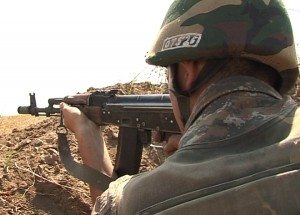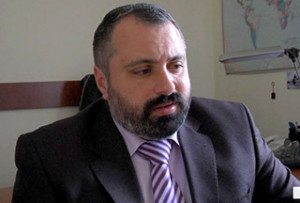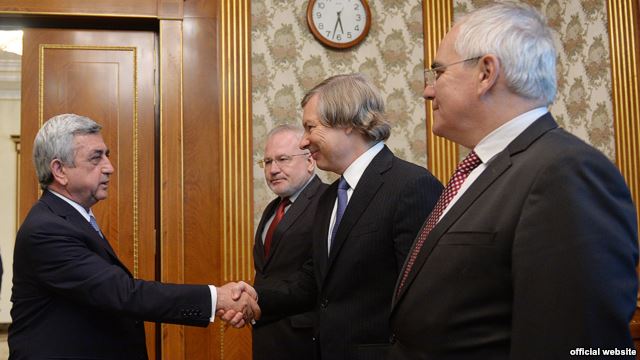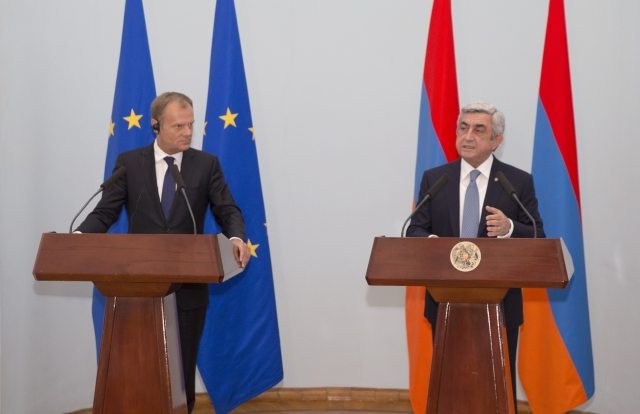Beglaryan: No Reason to Panic; We Trust the Artsakh Army
As the Azerbaijan Armed Forces continue to violate the ceasefire along the entire length of the Line of Contact, Artak Beglaryan, spokesperson for Nagorno Karabagh Republic (NKR) Prime Minister Arayik Harutyunyan, told the Armenian Weekly that the NKR Army is prepared to protect its borders and retaliate when needed.
Just last week, reports emerged claiming that Azerbaijani authorities had called on the country’s hospitals to be ready for war and started “intense military exercises,” raising the risk of an escalation in the Nagorno-Karabagh conflict.
Commenting on the news, Beglaryan said that the Aliyev regime continues to pretend to be in a perpetual state of war preparations, but neither the international community nor Armenians take this seriously.
“Everyone knows that despite the threats, Baku does not have enough of a motivation and the capabilities to attack Armenia and Artsakh,” Beglaryan told the Armenian Weekly, adding, “The NKR army is ready to protect our borders—if needed, with a disproportionate response. Just last year, Azerbaijan saw the power of the Armenian army. Hopefully, it took away some lessons, and will avoid large-scale actions.”
On July 21, hours after OSCE monitors visited the Line of Contact in the eastern direction of the Talish village of the Martakert region, during which no violations of the ceasefire agreement were registered, Azerbaijani troops continued firing at Armenian positions.
A statement released by the NKR Ministry of Defense said that during this time more than 1,600 shots were fired in the direction of Armenian military positions, by way of rifle and artillery weaponry including mortar, rocket-propelled grenade, and heavy machine gun. According to the Ministry of Defense, frontline forces of the NKR Defense Army took retaliatory actions, which supressed Azerbaijani attacks.
The Artsakh Army is in control of the situation and is “prepared for disproportionate and punitive measures,” announced the NKR Ministry of Defense in a written statement.
The intensified aggression from Azerbaijani troops comes at a time when representatives from international organizations—including Organization for Security and Co-operation in Europe (OSCE) Minsk Group co-chairs, European Council (EC) President Donald Franciszek Tusk, and OSCE monitors—are paying special visits to the two countries.
According to Beglaryan, though ceasefire violations continue on the border, the overall mood in Artsakh is calm. “People here don’t really see any reason to panic. We trust the army and are ready to provide any kind of support,” he said. “We just work hard every day to develop our country and its economy while being surrounded by secure borders.”
Babayan: Lack of international pressure triggers aggression
David Babayan, spokesperson for NKR President Bako Sahakyan, told reporters on July 22 that there is nothing unusual about the frequent ceasefire violations committed by Azerbaijani troops. “These actions are nothing new, and completely fit into the public policy of a terrorist and fascist state,” he was quoted as saying.
According to Babayan, the international community has failed to provide a strict assessment of Azerbaijani provocations. “The lack of such assessments triggers aggression. The Artsakh Defense Army takes relevant measures against that aggression; however, the international community should also make its own contribution to [such measures],” he said.
Commenting on the OSCE Minsk Group U.S. Co-Chair James Warlick’s statement earlier this week that the voice of Nagorno-Karabagh should be heard, Babayan said that it is imperative for Nagorno-Karabagh to participate in the peace process.
“We must participate in the whole process—from discussions and exchange of views to preparation and implementation of documents,” said Babayan.
When speaking about Azerbaijan’s territorial demands, Babayan said that there is “no returning to the past,” in terms of status or borders.
“There will be no bargaining over Artsakh’s independence. Artsakh has never been nor will it ever be part of Azerbaijan. There is no returning to 1988 or 1991. It is not a result of ambitions or abnormal geopolitical developments or ideas. Rather, they are minimal security guarantees. One cannot even think of Azerbaijan’s control of Berdzor and Qarvachar…” Babayan said, adding, “Azerbaijan is demanding territories from us, but we have territories that are occupied by Azerbaijan. Moreover, Azerbaijan’s demand would mean a 70 percent loss of territories for Nagorno-Karabagh. After all, we are struggling for our life and security, not for Azerbaijan’s ambitions.”
Responding to comments made by Russian Foreign Minister Sergey Lavrov on July 17 calling for intensifying efforts at finding peaceful settlement of the Nagorno-Karabagh conflict, Babayan expressed his agreement, but was not optimistic. “It is our desire that efforts be intensified. But we have no grounds for optimism. First of all, the full-fledged negotiation format has not been restored. Moreover, Azerbaijan continues its counterproductive policy,” he said.
Warlick: The occupied territories must be returned to Azerbaijan
Following a meeting with Russian Deputy Foreign Minister Grigory Karasin in Moscow, OSCE U.S. Co-Chair James Warlick in an interview with the Russian daily Vedomost said the “occupied” territories of Azerbaijan must be returned to Azeri control as part of a comprehensive settlement of the Nagorno-Karabagh conflict.
Speaking about his meeting with Karasin, Warlick said that the OSCE Minsk Group members would continue efforts to settle the conflict, and that they are looking forward to this year’s meeting with the presidents of Azerbaijan and Armenia. When asked about the territories “outside the Karabagh region,” Warlick said “the occupied territories must be returned to Azerbaijan” within the framework of a settlement.
A few days later, Warlick held a press conference during a visit to Armenia, during which he said that there cannot be a comprehensive settlement without a new meeting of the presidents of Armenia and Azerbaijan later this year, including a status for Nagorno-Karabagh.
“A part of a comprehensive settlement could include status, and there will need to be a free expression of the will of the population of Nagorno-Karabagh as part of that comprehensive settlement,” he said, adding that one of the key elements of the settlement will need to be the return by Armenia of “the territories surrounding Nagorno-Karabagh.”
“It’s clear that Armenia does not plan to return territory without adequate security guarantees,” Warlick said, hinting that those guarantees would include the deployment of international peacekeeping missions to the conflict area. He also said that the voice of “the de facto authorities in Stepanakert will need to be heard as part of any comprehensive settlement.”
Tusk visits Armenia and Azerbaijan
During his visit to Armenia on a three-day tour of the South Caucasus this week, European Council President Donald Franciszek Tusk said that he and Armenian President Serge Sarkisian had discussed the Nagorno-Karabagh conflict, and stated his concerns about what he called “recent negative trends” in the conflict. “The peaceful resolution of this conflict remains a priority for the EU,” said Tusk during a press conference with Sarkisan, and added that the EU will continue to support the negotiations aimed at settling the conflict led by the OSCE Minsk Group.
However, during his one-day visit to Baku two days later, Tusk made it clear that the EU has no plans to recognize Nagorno-Karabagh. “The EU supports the territorial integrity, independence, and sovereignty of Azerbaijan. The EU and its member states have not recognized Nagorno-Karabagh,” Tusk said.
Tusk reiterated his belief that there is no alternative to the peaceful settlement of the conflict, and added, “The status quo in the Nagorno-Karabagh conflict is unacceptable for me and the European Union.”
Tusk also shared his concerns about Azerbaijan’s dismal record on human rights while in Baku. “The EU believes that an open society is the best guarantee of long-term stability and prosperity. I have discussed with the President [Aliyev] our concerns with the detention of human rights defenders here and our hope that prompt action will be taken on the individual cases. We will continue to discuss these issues and to explore ways for good and mutually beneficial cooperation on human rights, also in the context of the future of our contractual relations,” he said.
Commenting on Tusk’s remarks, Beglaryan told the Armenian Weekly, “We realize that each country and union of countries has its own motivations based on rational interests—in this case, energy and geopolitical interests… We don’t expect their recognition of Artsakh’s development. We need to ensure the security and welfare of our people, and international recognition is only an additional guarantee for that path.”
Sarkisian: We will proceed along a path of reasonable compromises
During Tusk’s visit to Armenia, President Sarkisian used the opportunity to call for the self-determination of Artsakh during the joint press conference. “No matter how hard Azerbaijan tries to distort the essence of the Karabagh problem, the right of the people of Nagorno-Karabagh to decide their future by free expression of will has not been disputed for a long time. Moreover, this is said in statements of the OSCE Minsk Group Co-chairs. In the context of that idea, we are prepared to proceed along a path of reasonable compromises,” said Sarkisian.
The post Azerbaijan Continues Ceasefire Violations, Artsakh Army at the Ready appeared first on Armenian Weekly.



